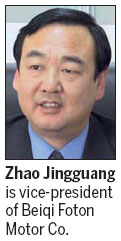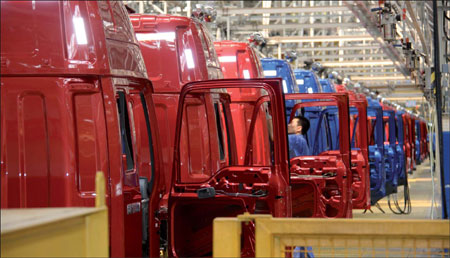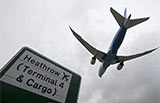In search of greener pastures
By Wang Chao (China Daily) Updated: 2012-10-19 17:35
|
A Beiqi Foton Motor Co factory in Beijing. The largest commercial vehicle maker in China is expanding to overseas markets to drive future growth. Provided to China Daily |
Truck makers in congested Chinese market set horizons overseas
Twenty years ago, foreign companies swarmed to China to make fortunes, but today the gold rush has been reversed, with Chinese companies prospecting overseas.
A leading Chinese truck maker is one with eyes on the international markets, especially emerging economies, at a time when domestic economic growth is slowing down.
 |
Established in Beijing in 1996, Beiqi Foton Motor Co has grown from a small agricultural machinery company to China's leading commercial vehicle manufacturer in terms of sales volume over the past decade. Its annual report shows that it earned 52 billion yuan (6.4 billion euros; $8.3 billion) in 2011 exporting 36,367 vehicles.
Foton have already made an impact on the world truck market this year. In March, it established a company in Kenya, another major investment in Africa after it opened a KD factory in east Africa last year. It also secured a site in India, where a factory will be built by the end of 2013.
"Foton will not be the high-end brand in the global market, but a medium-level one," says Zhao Jingguang, vice-president of Foton. "That means there is no luxury configuration, but the products will meet emission and safety standards."
In 2010, the company formed an overseas expansion strategy called "5+3+1". This means by 2020, it will build factories in five overseas markets (India, Russia, Brazil, Mexico and Indonesia), each with a production capacity of 100,000 units; make breakthroughs in three mature markets (North America, Europe, and South Korea-Japan); and build one R&D center in Beijing for new-energy vehicles.
Another truck manufacturer, China National Heavy Duty Truck Group Corp, also has ambitious plans to drive deep into the overseas market. Company president, Ma Chunji, says it aims to conquer six major markets including Southeast Asia, the Middle East and Russia.
Though these overseas adventures seem glorious and daring, they are also expensive and risky. The flux of companies moving outward in the past two years signals that the domestic market is no longer an easy one for Chinese companies.
Auto industry analysts say that the over-capacity of Chinese truck companies has forced them to think beyond China's borders.
At the end of 2011, there were more than 10 truck makers in the country, taking up 97 percent of the market. The saturated market is already slimming the company's profit margin, and is exacerbated by the economic downturn.
Shi Jianhua, deputy secretary-general of China Association of Automobile Manufacturers, says the commercial vehicle market is greatly affected by the macro-economy.
"The market may not be as bullish as in 2008 and 2009, and with the economy cooling down, the truck market is returning to mild growth," Shi says.
According to Xu Changming, director of the State Information Center's information resource unit, all sectors of the Chinese truck industry, including heavy-duty, medium and light trucks, suffered from the downturn. The heavy-duty truck sector was worst affected, shrinking by 30 percent in terms of sales volume.
Meanwhile, export figures from major truck companies have increased by more than 10 percent over the past nine months.
"So companies have to improve their product quality and think beyond the domestic market," Shi says. "Or many will find it hard to survive."
- Top 5 smart home applications attracting Chinese consumers
- China not encouraging mass steel exports: association
- Chinese company to supply more trains for Bangkok Skytrain
- PR agency calls China a booming innovative country
- Chinese construction industry expects sluggish growth: Moody's
- Baidu to shut down online forum to fight piracy
- Huawei denies plan to move headquarters out of Shenzhen
- Chinese couple brings TCM to Europe


















